When Mental Illness Makes It Hard to Practice Prevention for COVID-19
Editor's Note
If you struggle with obsessive-compulsive disorder (OCD), the following post could be potentially triggering. You can contact the Crisis Text Line by texting “START” to 741-741. To find help, visit the International OCD Foundation’s website.
At this point, it seems the whole world knows about the coronavirus — also known as COVID-19, the new virus that can lead to symptoms like fever, dry cough and shortness of breath.
The Centers for Disease Control and Prevention (CDC) has plenty of recommendations for how to “keep yourself safe,” including frequent hand washing, sanitizing surfaces, avoiding contact with others, etc. But what happens when your mental health condition interferes with these seemingly basic tasks?
When depression drains you of the energy to even get off the couch, better yet clean every surface and constantly wash your hands. When depression drains you of the energy to even shower. How do you keep “clean” when you haven’t even had the strength to wash your hair in three days? It just drives you deeper into depression. It can make you feel like a failure that you can’t do the simplest things that “everyone else” can. With depression, just the idea of washing up and cleaning can be completely overwhelming. Depression makes even the smallest task seem insurmountable.
What happens if you also have anxiety? Suddenly, your brain is spiraling. What if I don’t clean? What if I don’t do all the “right” things? Will I get sick? Will I die? What will happen!? Anxiety controls your thoughts and causes you to have uncontrollable worry and fear. It takes away any rational thought, and sends you into a chaotic place of terror. You don’t know what will happen. The “what-ifs” are infinite. Your brain feels like it is in a death spiral. There are so many things to think about. It’s not the same as being “worried” like many people might be. No, this is different. This is an overwhelming sense of doom — and a lack of control over not only your feelings, but your actions. Anxiety can be debilitating. For all the “worry” going on in your head, you can’t act on it, because you don’t even know where to start.
If you have obsessive-compulsive disorder (OCD), something as simple as being told to wash your hands or use hand sanitizer or disinfect surfaces may turn into an all-day (and night) obsessive amount of compulsive cleaning, washing, scrubbing, sanitizing and avoiding people at all costs. Telling someone with OCD to wash their hands, or keep surfaces clean can be a huge trigger for negative patterns, thoughts and actions. With OCD, there is often no “off’” button. Things must be done, or you will die. If things aren’t done “right” — sometimes repetitively to the point of injury — then something bad is sure to happen. OCD traps the brain in a loop of desperate attempts to ward off what seems like the end of the world. Things must be done. Sometimes over and over and over, until it feels right. Only, it never feels right, so you keep going, hoping eventually it will.
Mental health is difficult enough to manage. It’s a constant battle between rational and irrational thoughts. It can take every bit of energy to get through the day. Now, with the rapid spread of this new virus, I’m left wondering: How do I balance the rational and irrational thoughts in my head?
Part of me wants to clean all day, every day, until this virus is completely gone (irrational). Part of me knows keeping clean and washing my hands is a perfectly acceptable way to manage the situation (rational). Part of me thinks, “What if I get sick? I will die for sure!” (irrational). Part of me knows even if I do get sick, there are good doctors and hospitals well-equipped to handle it, and the chances of me getting sick are fairly low as I’m rarely exposed to people or places where I would encounter the virus (rational). Part of me says I should never ever touch my face in any way, shape or form again, and shower as many times a day as possible (irrational). Part of me knows I bite my nails all the time and despite my best efforts, will still probably end up doing it at some point, so I should wash my hands regularly (rational).
Mental health is a battle — constant thoughts swarm your mind and you are left trying to sort out which ones to listen to, and which to ignore. When a “crisis” situation hits, it only amplifies that problem, dramatically. The instinct is often to panic, or crawl into a corner and not leave. The instinct can be to break down in fear, or numb that fear with alcohol or drugs. The instinct is rarely rational. It requires conscious effort and dedication to keep your mental health balanced during these times. It requires determination not to let the “bad” thoughts win, and keep fighting to listen to the rational, “good” thoughts.
For people who struggle with mental health, something that may seem like just another “situation” we all are having to deal with can become a devastating meltdown and loss of the ability to think clearly. It can create such chaos in the mind that a person really can’t tell what to believe sometimes.
Concerned about coronavirus? Stay safe using the tips from these articles:
Getty image by tommaso79

